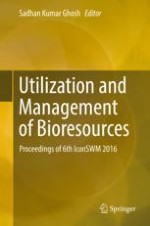2018 | OriginalPaper | Buchkapitel
Feasibility Study on Implementing Kitchen Waste-Based Biogas Plant at Tezpur University, Assam
verfasst von : Sachankar Buragohain, Dipam Patowary, Sampriti Kataki, Barkhang Brahma, Gunajit Dev Sarma, Rupam Patowary, Helen West, Michèle Clarke, D. C. Baruah
Erschienen in: Utilization and Management of Bioresources
Verlag: Springer Singapore
Aktivieren Sie unsere intelligente Suche, um passende Fachinhalte oder Patente zu finden.
Wählen Sie Textabschnitte aus um mit Künstlicher Intelligenz passenden Patente zu finden. powered by
Markieren Sie Textabschnitte, um KI-gestützt weitere passende Inhalte zu finden. powered by
